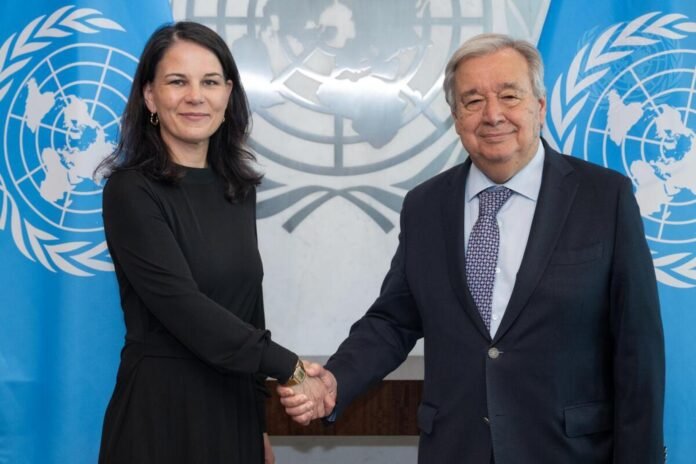Election of Annalena Baerbock as President
On June 2, 2025, Annalena Baerbock was elected as the President of the 80th United Nations General Assembly, marking a pivotal moment in the landscape of international diplomacy. Her election is significant not only because Baerbock is a prominent German politician but also because it symbolizes a shift towards progressive leadership at a global institution that bears the weight of immense global challenges. Her presidency arrives during a period characterized by complex geopolitical tensions, climate change, and public health crises, all of which necessitate adept leadership and collaborative solutions.
Baerbock’s election is expected to enliven the discourse surrounding crucial issues such as sustainable development, human rights, and climate action. Under her stewardship, the General Assembly is likely to prioritize a multilateral approach to addressing these challenges while engaging a wide array of stakeholders, including civil society. This inclusion may catalyze innovative solutions that reflect the voices of a diverse global population, thereby enhancing the legitimacy and effectiveness of the assembly’s resolutions.
The implications of Baerbock’s presidency extend beyond just procedural changes. As a vocal advocate for green policies and social justice, her leadership could represent a shift towards more progressive policies within the UN framework, fostering a sense of urgency around international climate agreements. The role of the General Assembly in fostering dialogues related to pressing global issues has never been more critical. Baerbock’s ability to navigate these discussions and harness the collective will of member states could pave the way for meaningful actions on an international scale.
As the world watches her presidency unfold, the potential for Baerbock to influence international relations is profound. Her election heralds an opportunity for a new chapter in global governance, emphasizing cooperation, accountability, and a commitment to addressing the pressing issues of our time.
Annalena Baerbock’s Political Background
Annalena Baerbock has established herself as a prominent figure in German and international politics, with a strong foundation built through her extensive political career. As a member of the Green Party, Baerbock has been a driving force in advocating for environmental issues, sustainability, and social justice. Her leadership within the party, particularly as co-chair since 2018, has significantly impacted the party’s growth and strategy, aligning it with contemporary concerns, such as climate change and human rights.
Her role as Germany’s Federal Minister for Foreign Affairs, which she assumed in December 2021, marked a significant milestone in her career. During her tenure, Baerbock faced numerous challenges, including navigating complex international relations, addressing security issues, and promoting Germany’s commitment to human rights and climate protection. One of her key achievements involved enhancing Germany’s diplomatic relationships within Europe and with global partners, emphasizing multilateralism and collective action in addressing global crises. This focus was evident in her proactive stance on issues such as the Russian invasion of Ukraine, where she firmly supported sanctions and strengthened ties with allied nations.
Before her ministerial role, Baerbock’s political journey included serving as a member of the Bundestag, where she contributed to various committees, focusing on topics such as European policy and climate protection. Her academic background in political science and public international law equipped her with the necessary expertise to understand complex legal frameworks, making her a formidable negotiator on the global stage. Baerbock’s rich tapestry of experiences, from grassroots activism to high-level diplomacy, underpins her capability to serve as President of the 80th United Nations General Assembly, representing Germany’s interests while fostering international collaboration.
Advocacy for Multilateralism and Global Cooperation
Annalena Baerbock’s entry into her role as President of the 80th United Nations General Assembly marks a renewed commitment to multilateralism and global cooperation. Throughout her political career, Baerbock has consistently advocated for collaborative engagement among nations, recognizing that many of the world’s pressing challenges can only be addressed through unified efforts. She envisions the United Nations as a central platform for fostering dialogue and building consensus on critical global issues.
Climate change stands at the forefront of Baerbock’s agenda. She has previously highlighted the urgency of international collaboration to mitigate its effects, calling for comprehensive agreements that bind nations to uphold their environmental responsibilities. Her emphasis on sustainable development not only addresses ecological concerns but also promotes economic equity among nations, emphasizing that climate action should benefit all and not just a few. By leading initiatives that emphasize climate justice, Baerbock aims to galvanize nations into implementing practical solutions while prioritizing the most vulnerable communities, irrespective of their geographical location.
Additionally, Baerbock’s stance on human rights reflects her dedication to advancing the principles that the UN was established to uphold. She has been a vocal supporter of movements for democracy, women’s rights, and the protection of minorities. Her presidency will likely see an intensified focus on these issues, reinforcing the notion that human rights are integral to sustainable international relations. Baerbock recognizes that addressing human rights abuses necessitates collaborative strategies and actionable outcomes, fostering a cooperative approach among member states.
Conflict resolution is another area where Baerbock intends to drive enhanced cooperation. By promoting diplomatic dialogue, she believes the UN can play an essential role in mediating disputes and preventing conflicts. Her experience will inform efforts to encourage nations to engage constructively, exchange ideas, and develop frameworks for peace. Overall, Baerbock’s vision expands upon the existing principles of multilateralism, striving to enhance the effectiveness and impact of the United Nations during her presidential tenure.
Personal Life and Educational Background
Annalena Baerbock was born in Hanover, Germany, where her formative years were shaped by a supportive family environment. Growing up in a region marked by a strong sense of community, Baerbock developed an appreciation for civic engagement early on. This upbringing has significantly influenced her commitment to political activism and her understanding of socio-political dynamics in Germany and beyond.
Her academic journey is equally noteworthy. Baerbock pursued her undergraduate studies in political science at Hamburg University, where she honed her analytical skills and gained a robust understanding of political theories and systems. This foundational education was pivotal in nurturing her passion for international relations and public policy. After completing her bachelor’s degree, she furthered her academic credentials by obtaining a Master of Laws from the prestigious London School of Economics (LSE). During her time at LSE, Baerbock engaged with a diverse cohort of international students, which broadened her perspectives on global issues and enriched her approach to diplomacy.
In her personal life, Baerbock is a nurturing mother of two daughters, balancing her demanding political career with family responsibilities. This dual role has imbued her leadership style with empathy and a nuanced understanding of the challenges faced by working parents in contemporary society. Her experiences as a mother have not only influenced her policy priorities, focusing on issues such as childcare and education but have also informed her advocacy for gender equality in political representation. Throughout her journey, Baerbock’s personal and educational experiences have seamlessly converged, shaping her into a committed politician ready to lead on both national and global stages.



My developer is trying to convince me to move to .net from PHP. I have always disliked the idea because of the expenses. But he’s tryiong none the less. I’ve been using WordPress on a number of websites for about a year and am nervous about switching to another platform. I have heard good things about blogengine.net. Is there a way I can import all my wordpress posts into it? Any kind of help would be greatly appreciated!
Way cool, some valid points! I appreciate you making this article available, the rest of the site is also high quality. Have a fun.